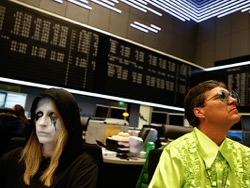
Brazil is today the largest bankrupt on the planet, though not the only one. The world in General has ceased to fulfill the obligations that its most significant economic (G20) took over two years ago: by 2018, to achieve growth in the economy by 2.1 percentage points higher compared with the performance predicted by the International monetary Fund in 2013.
Since the projected increase was 2.9%, so in 2018 the global economy needs to show us a fabulous rate of 5%.
Now the IMF says that this goal will not be achieved, unless a miracle happens, which don’t have even a weak hint.
Worse, publishing “perspectives of development of world economy”, each time the Fund is forced to lower growth forecasts. On Tuesday (12 April) was declared to be the figure for that year, amounting to 3.2 per cent — the lowest level since 2009 (when the world out of the great recession) and 0.2 percentage point below the previous forecast.
The IMF also reduced to one-tenth the expected growth for next year, bringing it to 3.5%.
That is, instead of 2.1 percentage points higher than expected 2.9% in 2013, the world economy shows growth only for a few tenths of a percent, which is not enough to restore confidence.
Or, as IMF chief economist Maurice Obstfeld, “too slow pace of recovery in the global economy provoke a reduction in investment, resulting in growth becomes insufficient to achieve full employment and higher wages, and this, in turn, could have dangerous political consequences”.
These words perfectly characterize taking place in Brazil, with the aggravating circumstance that we are not talking about lower growth, but about the unprecedented setback, at least to the period of the great depression of 1929/30, i.e. for a century.
The impeachment Dilma Rousseff moved forward as much, if not for the sharp decline of the economy and its inevitable consequences: higher unemployment, lower wages, lower investment in short, all Obstfelder ingredients for the emergence of political tensions.
It should be recalled that Dilma Rousseff signed the final document of the summit Big twenty, which was promised growth, 2.1 percent higher than expected in 2013.
In addition, the President submitted a list of investments that allowed Brazil to contribute to the attainment of the world economy objectives (specific objectives for each of the G20 countries have not been scheduled).
At the summit Big twenty in Antalya (Turkey) Dilma already acted as the head of the government with the worst economic indicators, if not to take into account Russia, then the IMF predicted the Brazilian economy three-percent reduction (it was worse: 3.8 per cent).
Meanwhile, to date, the disaster has become global in nature: even Russia with its decline of 1.8%, caused not so much damage as Brazil (3.8 per cent).
It is obvious that if the economy grew, the so-called intentional delay state payments likely would have passed unnoticed.
However, the economic failure has provoked political tensions, which today is reaching a boiling point.
Not comforted by the fact that their commitment violates the whole world. This clearly shows that the authorities no longer have the tools to enhance the growth of its economy.








